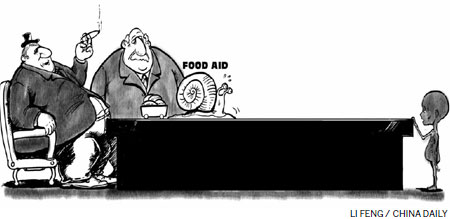|

As the G8 leaders meet in the United States this week, agriculture and food security must be at the forefront of the discussions, and ways to prevent price volatility, including halting grain-based biofuels production, establishing grain reserves for emergency use, eliminating food export bans and increasing the transparency of food and agricultural market information, should be addressed.
Most importantly, the G8 leaders should fulfill their commitments on global food security.
In 2009, G8 leaders made considerable financial commitments to global agriculture and food security, pledging to mobilize $22 billion over three years through a coordinated, comprehensive strategy focused on sustainable agriculture development. But as of May 2011, it was estimated that only 22 percent of these commitments had been disbursed.
In addition to the G8 leaders, the heads of states from Ethiopia, Ghana, Benin and Tanzania will take part in the summit discussions. The direct participation by these African leaders underscores the seriousness of the food security situation on the continent, where more than 220 million people are undernourished. Millions suffer from micronutrient deficiencies, a total of 100 million women and children are iron deficient, and 33 million children have Vitamin A deficiencies. The 2011 Global Hunger Index, a combined measure of the proportion of undernourishment, child malnutrition, and child mortality, shows that Sub-Saharan Africa is home to all the countries with "extremely alarming" scores and many of the countries with "alarming" scores.
In addition, it is projected that smallholder farmers, particularly those living in the highland areas and semi-arid savannahs in Sub-Saharan Africa, face increasing natural resource scarcity risks, including land degradation, which can cost as much as 10 percent of national GDP. Many parts of the region are extremely vulnerable to both man-made and natural shocks. Last year, more than 13 million people were affected by the drought in the Horn of Africa. This year more than 15 million people across seven countries in the Sahel region are already suffering from severe food insecurity or at risk.
It is crucial that developed countries take action to fight starvation in Africa. The cost of hunger is high, and the damage is irreversible.
For over three decades now, the International Food Policy Research Institute has been engaged in promoting the transformation of smallholder agriculture across Africa through evidence-based research and support to country-driven development initiatives. Priority areas include: building capacity for agricultural and food policy analysis and supporting country-led development strategies; improving nutrition along value chains to increase poor people's access to nutritious foods and increasing the availability, access, and intake of nutrient-rich, biofortified staple foods for the poor; resilience-enhancing schemes such as productive social safety nets, weather insurance index, and other risk management tools that help reduce vulnerability and enhance resilience to shocks and contribute to overall long-term growth and prosperity.
Technological innovations such as biotechnology, nanotechnology, and biofortification are crucial to increasing agricultural productivity, building resilience to weather-related shocks, enhancing the nutritional value of food crops, and ensuring food safety. Biotechnology has great potential to improve crop yield, nutrition and resilience to weather shocks, which will be even more frequent in the future due to climate change.
As the world's population increases, there is enormous pressure on the planet's ecosystems. The most reasonable solution to feeding the ever-growing population is sustainably producing more food on the existing land. Scaled-up investments in science and technology and support for improved country capacities are essential to accelerate progress and achieve development objectives.While the governments of developing countries have taken important steps to boost food security-related investments, support from the G8 countries remains critical.
The author is director-general of International Food Policy Research Institute based in Washington.
(China Daily May 18, 2012) |
